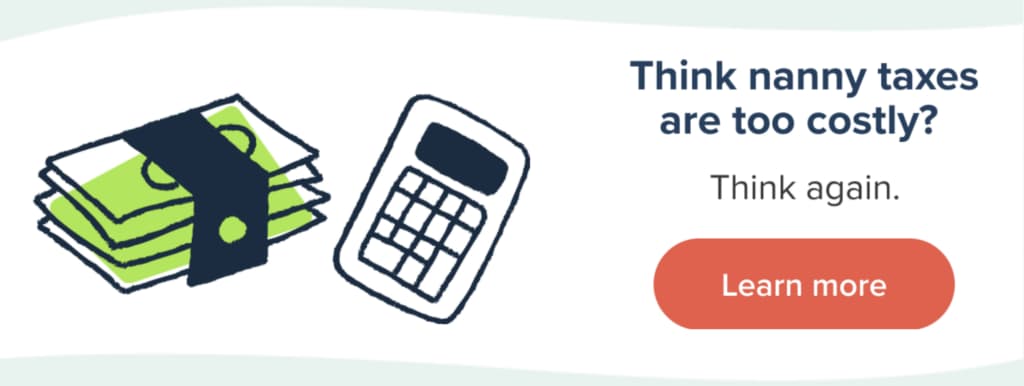On March 18, 2020, the President signed the Families First Act to help employers and their employees deal with the personal and financial strain associated with COVID-19. The law took effect April 1, 2020 and does cover household employers. However, under the recently signed Continuing Appropriations Act 2021, employers are no longer required to provide the paid leave explained below.
We know families have a lot of questions about these laws, so we wanted to address them so you can feel informed. The biggest impact to household employers are the refundable payroll tax credits available through March 31, 2021. These are designed to reimburse families dollar for dollar for the cost of providing Coronavirus-related leave. This could result in thousands of dollars in tax credits. Additionally, the Families First Act provides paid sick leave and paid family leave for employees that are affected by COVID-19.
Here are the most pressing questions we’re seeing about the items within the Families First Act and what it could mean for your family and household employees.
How much paid sick time may my caregiver receive?
Your nanny or caregiver is eligible to take up to 80 hours of paid sick time if they work full-time for you. If your household employee works part-time, their paid sick time will be the average weekly hours they typically work in a two week period. Sick time is available to be taken immediately, regardless of how long your employee has worked for you, but it will expire on March 31, 2021 if it is not used.
How much expanded FMLA (paid family leave) can my caregiver receive?
If your caregiver needs to take paid family leave to care for their children because their school or daycare is closed, they are eligible to take a total of 12 weeks, but the first two weeks can be unpaid time off. The remaining 10 weeks would need to be paid if your employee needs them.
When would it be appropriate for my nanny or caregiver to use their paid sick time?
Your caregiver may use their paid sick time for any of the following reasons:
They are subject to a federal, state or local quarantine order related to the coronavirus.
They are experiencing COVID-19 symptoms and need to be diagnosed by a medical official.
They have been advised by a health care provider to self-quarantine because of the coronavirus.
They are caring for a family member who has symptoms of the coronavirus or has to self-isolate due to a doctor’s order.
They have to care for their child because their school or daycare has closed due to the coronavirus, or if their personal child care provider is not available.
When would it be appropriate for my employee to use expanded FMLA (paid family leave)?
Your employee is eligible to use paid family leave if they cannot work due to their child’s school or daycare being closed – or if their normal caregiver cannot take care of their children. Unlike paid sick time, expanded FMLA is not tied to your employee’s child being ill.
I already offer paid sick time and paid time off to my caregiver in their contract. Would I need to provide this additional leave?
Yes, if your household employee meets the qualifications we just listed, they would be given this new mandated paid sick time and expanded FMLA benefit in addition to what you already offer. Additionally, your caregiver would have to use the newly mandated paid sick time hours before any other paid sick time you offer can kick in. However, your employee may use paid vacation days or other paid time off that you offer during the two weeks where family leave is unpaid.
How much would I have to pay my caregiver if they cannot work?
This will depend on the type of leave your employee needs to use.
If your nanny or caregiver goes to the doctor to be diagnosed for COVID-19, be treated for the illness or must miss work due to contracting COVID-19, they would earn paid sick time at their normal hourly rate, up to $511 per day.
If your caregiver has to miss work to care for a family member with COVID-19 or care for their child because their school or daycare is closed due to the coronavirus, they would also earn paid sick leave, but only at 2/3rds of their normal hourly rate, up to $200 per day. You would be welcome to pay your caregiver their full hourly rate, but the additional amount would not apply to a tax credit that we will outline later.
If your employee is unable to work because they have to care for a child under the age of 18 whose school or place of care has been closed, they may earn expanded FMLA (paid family leave) benefits at 2/3rds of their normal hourly rate, up to $200 per day. Again, you would be free to pay your employee their full hourly rate instead, but this additional amount will not count toward a tax credit.
Would the Family First Act give me a tax credit for this additional required paid time off?
Yes, employers not exempt from this law will be entitled to a tax credit equal to the sick leave and/or expanded FMLA wages paid to your employee while they are out of work.
If your nanny or caregiver had to self-isolate because of the coronavirus, 100% of the sick time you paid to them will be refunded to you, up to $511 per day for up to 10 days. This applies for each employee you have.
If your nanny or caregiver used sick time to care for a family member or child, they’ll receive 2/3rds of their regular wages and your credit will be capped at $200 per day for up to 10 days. Again, this applies for each employee you have.
If your nanny or caregiver had to take expanded FMLA (paid family leave), they are paid 2/3rds of their hourly rate and your credit will be capped at $200 per day and $10,000 total.
The credit is refundable to families, which means if you paid more money for sick time and/or expanded FMLA benefits than you owed in Social Security and Medicare taxes, you would be refunded the difference.
What if I had to temporarily lay my employee off due to COVID-19 concerns?
Under the Families First Act, your nanny or caregiver may be able to file for unemployment benefits if they have their hours reduced or are let go because of the effects of the coronavirus. Your state’s department of labor (or agency that handles unemployment claims) would make the determination of whether your caregiver could receive financial assistance while they are out of work.
What if my caregiver is being paid under the table? Would they still receive benefits?
No, unemployment benefits, paid family leave and paid time off are contingent on employers following through with the tax and payroll process. If your caregiver is paid under the table, only the agreement you have with them for paid time off will apply if they contract the COVID-19 virus. Additionally, if you’re paying your employee under the table, you would not be eligible for the tax breaks mentioned above while they recover.
Can HomePay help me catch up on my taxes if I’m not paying my caregiver on the books?
Yes, we do provide catch-up services for families that have been paying under the table. We’re happy to help you get your household employment taxes in order so you can qualify for tax credits and your caregiver can qualify for paid sick time, expanded FMLA or unemployment benefits if they need it. Call our office at (888) 273-3356 and we’ll handle everything so you’ll be caught up on your household employment obligations
Other Helpful Resources:

